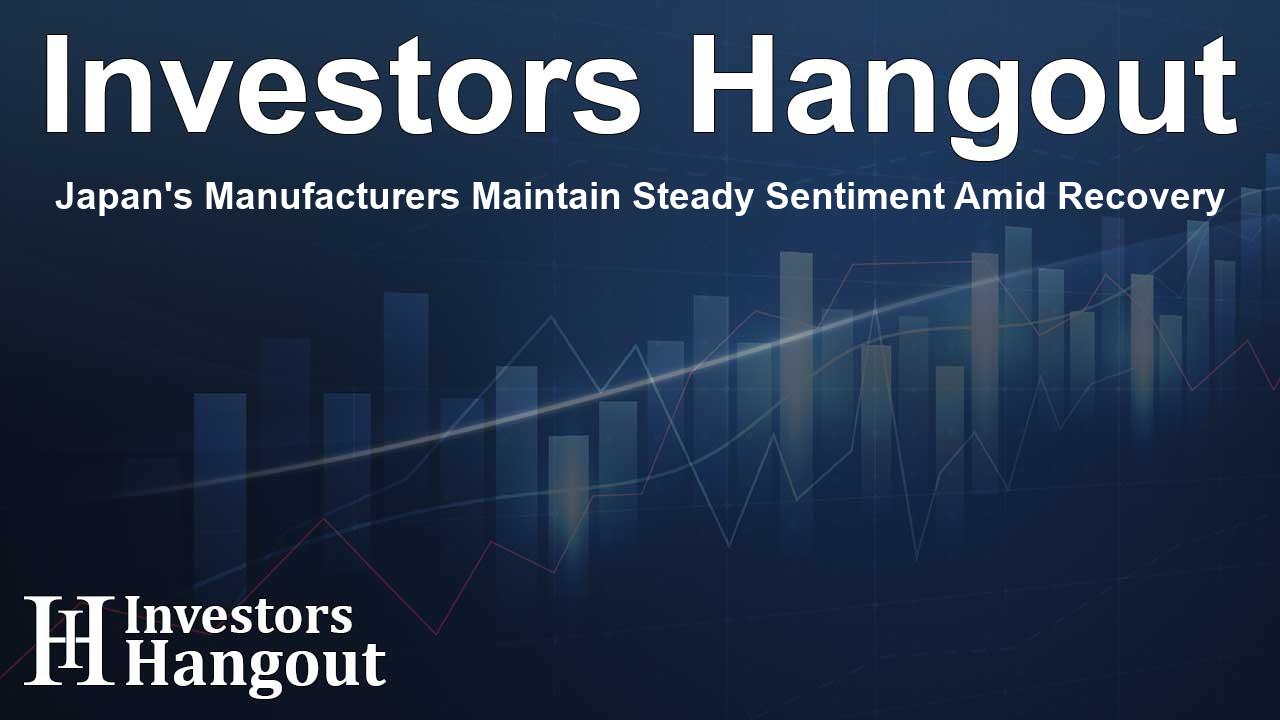Japan's Manufacturers Maintain Steady Sentiment Amid Recovery

Japanese Manufacturers' Steady Sentiment Observed
Recently, the sentiment among large manufacturers in Japan has shown stability over the quarter leading to September, reflecting the underlying resilience of the economy despite global challenges.
Insights from the BOJ's Tankan Survey
The Bank of Japan's (BOJ) latest 'tankan' survey reveals that big non-manufacturers have experienced a notable improvement in their business mood, highlighting the enduring strength of domestic demand within the economy.
Understanding the Tankan Survey Data
The tankan results will play a critical role in shaping monetary policy as the BOJ prepares for its upcoming meeting. The bank will evaluate fresh growth and inflation forecasts during its discussions on October 30-31.
Confidence Indices Reflect Stability
The headline confidence index for large manufacturers held steady at +13 in September, consistent with the reading from June and in line with market expectations. Meanwhile, the sentiment index for non-manufacturers rose to +34, slightly up from +33 earlier, surpassing predictions for +32.
Capital Spending Projections
Notably, large firms anticipate a capital spending increase of 10.6% for the fiscal year ending in March 2025. This figure is somewhat lower than the median market forecast that anticipated an 11.9% growth in spending.
Expectations of Future Conditions
Looking ahead, large manufacturers expect conditions to gradually improve over the next three months, whereas non-manufacturers predict a potential decline in conditions. These differing projections illustrate the dynamic nature of the economic landscape.
Impact of BOJ's Monetary Policy Shifts
The BOJ ended its negative interest rate policy earlier this year and raised its short-term rate to 0.25% in July, a move seen as an acknowledgment of Japan's ongoing progress towards achieving a sustained 2% inflation target.
The Role of Company Sentiment
Governor Kazuo Ueda has indicated that should corporations continue to lift wages and prices in light of optimistic forecasts, the central bank remains poised to implement additional rate hikes to maintain inflation around its target level.
Japan's Economic Growth Factors
In the second quarter, Japan's economy saw an annualized growth rate of 2.9%, supported by increased consumer spending fueled by steady wage increases. While capital expenditures are on the rise, concerns remain regarding sluggish demand from China and a slowing economy in the U.S., which could impact Japan's export-driven growth.
Analyzing the Tankan Sentiment Diffusion Index
The sentiment diffusion indexes from the tankan are calculated by subtracting the percentage of businesses reporting poor conditions from those reporting good conditions. A positive index reading signifies that the number of optimists exceeds the number of pessimists, indicating a generally positive outlook among manufacturers.
Frequently Asked Questions
What does the tankan survey measure?
The tankan survey assesses the sentiment of businesses in Japan, indicating the overall economic outlook among large manufacturers and non-manufacturers.
What are the current confidence levels for Japanese manufacturers?
As per the latest survey, the confidence index for big manufacturers stands at +13, while for non-manufacturers, it is at +34.
How is capital spending expected to change?
Large companies expect their capital spending to rise by 10.6% for the fiscal year ending March 2025, which is lower than previous forecasts.
What impact does BOJ policy have on economic growth?
The BOJ's monetary policy, including interest rate adjustments, significantly influences economic growth by impacting inflation and spending behaviors.
How does the tankan survey affect monetary policy?
The tankan survey's outcomes inform the BOJ's decisions regarding interest rates and future economic forecasts, as it reflects business confidence and expectations.
About Investors Hangout
Investors Hangout is a leading online stock forum for financial discussion and learning, offering a wide range of free tools and resources. It draws in traders of all levels, who exchange market knowledge, investigate trading tactics, and keep an eye on industry developments in real time. Featuring financial articles, stock message boards, quotes, charts, company profiles, and live news updates. Through cooperative learning and a wealth of informational resources, it helps users from novices creating their first portfolios to experts honing their techniques. Join Investors Hangout today: https://investorshangout.com/
Disclaimer: The content of this article is solely for general informational purposes only; it does not represent legal, financial, or investment advice. Investors Hangout does not offer financial advice; the author is not a licensed financial advisor. Consult a qualified advisor before making any financial or investment decisions based on this article. The author's interpretation of publicly available data shapes the opinions presented here; as a result, they should not be taken as advice to purchase, sell, or hold any securities mentioned or any other investments. The author does not guarantee the accuracy, completeness, or timeliness of any material, providing it "as is." Information and market conditions may change; past performance is not indicative of future outcomes. If any of the material offered here is inaccurate, please contact us for corrections.